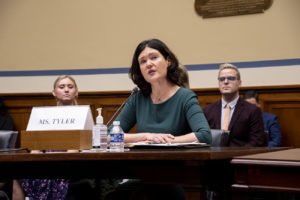Texas chaplains urge school boards to reject program
More than 100 Texas chaplains—including at least 34 Baptists—signed an open letter to all school board members in the state, urging them to reject government-approved chaplains in public schools.
“Because of our training and experience, we know that chaplains are not a replacement for school counselors or safety measures in our public schools, and we urge you to reject this flawed public policy,” the letter states. “It is harmful to our public schools and the students and families they serve.”
SB763—approved by Texas lawmakers in May and signed by Gov. Greg Abbott in June—calls on school districts to vote on whether to create a paid or volunteer chaplain program. The law goes into effect Sept. 1.
About 10 percent of the chaplains who signed the letter are affiliated with the Baptist General Convention of Texas, said Eric Whitmore, associate endorser for Texas Baptists. Fourteen of the chaplains identified with the Cooperative Baptist Fellowship.
‘Spiritual malpractice’
In part, the chaplains registered opposition to the public school chaplain program on religious liberty grounds.
“As trained chaplains, we strongly caution against the government assertion of authority for the spiritual development and formation of our public school children,” the letter states. “We would never provide spiritual care to someone without their consent. And when children are involved, parental consent is necessary.
“Not only are chaplains serving in public schools likely to bring about conflict with the religious beliefs of parents, but chaplains serving in public schools would also amount to spiritual malpractice by the chaplains.”
The letter asserts government-sanctioned chaplains “make sense in some settings”—such as the military, prisons or hospitals, where individuals cannot otherwise access religious services—but “not in our public schools.”
“Public school children simply do not face the barriers to religious exercise that service members, prisoners, and patients face. Parents or guardians must have the right to choose the religious leaders who will influence their children’s spiritual journey,” the letter states. “Public schools should not interfere or alter parental decisions in the realm of religious exercise or spiritual care.”
Education and expertise required
The letter notes SB763 does not require any specific training or qualifications for public school chaplains. It also does not demand chaplains refrain from proselytizing in schools or require them to serve students from different religious backgrounds.
“SB763 allows a school district to give any employee or volunteer who can pass a background check the title of ‘chaplain.’ This is simply not enough,” the letter states.
The letter points out professional chaplains “have specific education and expertise to fulfill our role in helping others engage their own religious practices and traditions.”
Normally, chaplains are required to have a graduate theological degree and be endorsed by an approved religious organization or denominational body. In some settings, chaplains must have one to two years of full-time experience as a spiritual leader, and often they are ordained ministers.
The letter points out the law provides for chaplains’ salaries to be drawn from funds dedicated “to improve school safety and security.”
“Those funds are directed at—but not limited to—the roles of restorative discipline and justice practices, mental and behavioral health support, and suicide prevention, intervention and postvention. We are deeply concerned about using chaplains in these roles to provide these services, particularly as the law does not require any specific training or qualifications,” the letter states.
The chaplains who endorsed the letter noted they work in cooperation with mental health counselors, not in competition with them. For example, therapists and police investigators receive specialized training to interview juveniles about sensitive matters, but many chaplains do not have that expertise.
Furthermore, chaplains typically are not trained in active-shooter situations or in how to be public safety professionals, the letter notes.
The letter to school board members concludes: “We urge you to support religious freedom and parental rights by rejecting this harmful program to have government-approved chaplains in our public schools. We believe that a strong public school system is one in which the limited funding for safety and security of students is used to hire the most skilled professionals for those roles. We believe that families, not the government, are entrusted with their children’s spiritual development.”
‘Misguided effort’ that will inject division

The Baptist Joint Committee for Religious Liberty, the Interfaith Alliance and Texas Impact organized and released the letter.
“Public schools are not the place for religious instruction. That is best left to houses of worship, religious institutions and families,” BJC Executive Director Amanda Tyler said.
Tyler expressed concern about “growing Christian nationalism” in Texas.
“Christian nationalism conflates religious and political authority, and our public schools should not be endorsing religion. They should continue to leave that up to the students and their families,” she said.
“School districts should reject this misguided effort to inject more religion and division in our schools.”